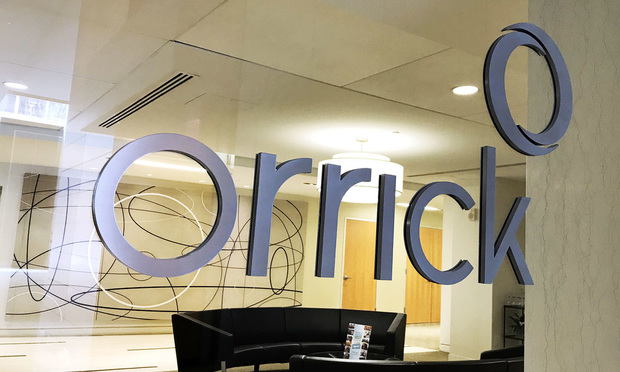Ninth Circuit Fleshes Out Standards for Copyright Infringement
Orrick's Christopher Cariello says the decision on vicarious liability and willful infringement provides breathing room for website owners who publish collaborative or user-generated content.
April 18, 2019 at 09:36 AM
4 minute read
 (Photo: Diego M. Radzinschi/ALM)
(Photo: Diego M. Radzinschi/ALM)
The merely negligent publication of an unlicensed photograph on a website is not going to cost $150,000 in statutory damages for copyright infringement.
At least it won't in the Ninth Circuit, thanks to some pro bono IP lawyering from Orrick Herrington & Sutcliffe.
The court ruled Tuesday that Kraig Kast is entitled to a new trial over three copyrighted photos that were uploaded to a wealth management website he had under development. Although nobody other than Kast and his developer viewed the photos, he was ordered to pay $450,000 after jurors were instructed they could find willful infringement if Kast knew or should have known the website was infringing.
“Should have known” is a negligence test, Judge Michael Daly Hawkins wrote for a unanimous panel in Erickson Productions v. Kast.
“Negligence is a less culpable mental state than actual knowledge, willful blindness, or recklessness, the three mental states that properly support a finding of willfulness.”
Absent willfulness, the maximum statutory damages are $30,000 per infringing use, which would likely cap Kast's exposure to $90,000 in a retrial.
 Chris Cariello, Orrick senior associate. (Photo: Courtesy Photo)
Chris Cariello, Orrick senior associate. (Photo: Courtesy Photo)Orrick senior associate Christopher Cariello argued the appeal after the Ninth Circuit send out a request for pro bono assistance for Kast, who had been representing himself on appeal.
The Ninth Circuit regularly seeks help in immigration, excessive force and prisoners' rights cases. In this instance, the court was looking for counsel to brief the willfulness issue, along with whether Kast was vicariously liable for infringing acts by his web developer.
“I do a lot of copyright work,” said Cariello, who's part of Orrick's U.S. Supreme Court and appellate group. “So I jumped at the opportunity.”
Cariello said the vicarious liability issue, while more wonky, has significant implications for internet publishers of collaborative or user-generated content. To be held vicariously liable for another's infringement, a plaintiff has to prove the defendant obtained a direct financial benefit from the infringement. The Ninth Circuit ruled that standard wasn't met, even if Kast may have avoided paying photographer Jim Erickson's license fee.
Erickson had licensed his photos to Wells Fargo, which operated a competing website Kast was trying to emulate. Three of Erickson's photos were copied from the Wells Fargo site to Kast's site, though there was some dispute as to how much control Kast exercised over the decision.
Either way, Erickson argued that Kast should be vicariously liable because he benefited from not having to pay a license. The Ninth Circuit ruled that cannot supply the basis for vicarious infringement. “Otherwise, the requirement of a direct financial benefit would be rendered meaningless, since … a direct infringer necessarily saves money by failing to obtain a license,” Hawkins wrote.
The Ninth Circuit described it as a decision of first impression for any circuit. But Cariello said the fact pattern is not uncommon on the internet. Suppose, for example, a company hires a consultant to publish a Twitter feed, and the consultant includes an infringing photograph in the feed. Before the company can be held liable, a plaintiff will have to show that the infringement provided some benefit to the company's bottom line beyond the avoided license fee.
“It's hugely significant on the internet, where you can have so many different parties providing content that's publicly accessible,” Cariello said.
The Ninth Circuit did uphold the jury's finding that Kast was liable for contributory infringement, an issue that was outside the scope of the pro bono briefing.
Kevin McCulloch of The McCulloch Law Firm had argued that the Ninth Circuit previously rejected the notion that damages questions—“how much money someone made, how many people went to a website”—should be an element of copyright liability.
“The website is owned by Mr. Kast, the business is owned by Mr. Kast, he started it for commercial purposes. He got all the money,” McCulloch argued at the March hearing. “If there was any benefit at all, it went to Mr. Kast and nobody else.”
This content has been archived. It is available through our partners, LexisNexis® and Bloomberg Law.
To view this content, please continue to their sites.
Not a Lexis Subscriber?
Subscribe Now
Not a Bloomberg Law Subscriber?
Subscribe Now
NOT FOR REPRINT
© 2025 ALM Global, LLC, All Rights Reserved. Request academic re-use from www.copyright.com. All other uses, submit a request to [email protected]. For more information visit Asset & Logo Licensing.
You Might Like
View All
'It's Not Going to Be Pretty': PayPal, Capital One Face Novel Class Actions Over 'Poaching' Commissions Owed Influencers

'Biggest Influencer Scam of All Time'?: PayPal Accused of Poaching Commissions Via Its 'Honey' Browser Extension


Trending Stories
- 1States Reach New $7.4B Opioid Deal With Purdue After SCOTUS Ruling
- 2$975,000 Settlement Reached After Fall on Sidewalk
- 3'Where Were the Lawyers?' Judge Blocks Trump's Birthright Citizenship Order
- 4Big Law Sidelined as Asian IPOs in New York Are Dominated by Small Cap Listings
- 5Netflix Music Guru Becomes First GC of Startup Helping Independent Artists Monetize Catalogs
Who Got The Work
J. Brugh Lower of Gibbons has entered an appearance for industrial equipment supplier Devco Corporation in a pending trademark infringement lawsuit. The suit, accusing the defendant of selling knock-off Graco products, was filed Dec. 18 in New Jersey District Court by Rivkin Radler on behalf of Graco Inc. and Graco Minnesota. The case, assigned to U.S. District Judge Zahid N. Quraishi, is 3:24-cv-11294, Graco Inc. et al v. Devco Corporation.
Who Got The Work
Rebecca Maller-Stein and Kent A. Yalowitz of Arnold & Porter Kaye Scholer have entered their appearances for Hanaco Venture Capital and its executives, Lior Prosor and David Frankel, in a pending securities lawsuit. The action, filed on Dec. 24 in New York Southern District Court by Zell, Aron & Co. on behalf of Goldeneye Advisors, accuses the defendants of negligently and fraudulently managing the plaintiff's $1 million investment. The case, assigned to U.S. District Judge Vernon S. Broderick, is 1:24-cv-09918, Goldeneye Advisors, LLC v. Hanaco Venture Capital, Ltd. et al.
Who Got The Work
Attorneys from A&O Shearman has stepped in as defense counsel for Toronto-Dominion Bank and other defendants in a pending securities class action. The suit, filed Dec. 11 in New York Southern District Court by Bleichmar Fonti & Auld, accuses the defendants of concealing the bank's 'pervasive' deficiencies in regards to its compliance with the Bank Secrecy Act and the quality of its anti-money laundering controls. The case, assigned to U.S. District Judge Arun Subramanian, is 1:24-cv-09445, Gonzalez v. The Toronto-Dominion Bank et al.
Who Got The Work
Crown Castle International, a Pennsylvania company providing shared communications infrastructure, has turned to Luke D. Wolf of Gordon Rees Scully Mansukhani to fend off a pending breach-of-contract lawsuit. The court action, filed Nov. 25 in Michigan Eastern District Court by Hooper Hathaway PC on behalf of The Town Residences LLC, accuses Crown Castle of failing to transfer approximately $30,000 in utility payments from T-Mobile in breach of a roof-top lease and assignment agreement. The case, assigned to U.S. District Judge Susan K. Declercq, is 2:24-cv-13131, The Town Residences LLC v. T-Mobile US, Inc. et al.
Who Got The Work
Wilfred P. Coronato and Daniel M. Schwartz of McCarter & English have stepped in as defense counsel to Electrolux Home Products Inc. in a pending product liability lawsuit. The court action, filed Nov. 26 in New York Eastern District Court by Poulos Lopiccolo PC and Nagel Rice LLP on behalf of David Stern, alleges that the defendant's refrigerators’ drawers and shelving repeatedly break and fall apart within months after purchase. The case, assigned to U.S. District Judge Joan M. Azrack, is 2:24-cv-08204, Stern v. Electrolux Home Products, Inc.
Featured Firms
Law Offices of Gary Martin Hays & Associates, P.C.
(470) 294-1674
Law Offices of Mark E. Salomone
(857) 444-6468
Smith & Hassler
(713) 739-1250






